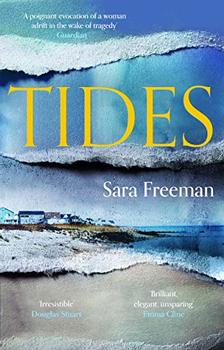Summary | Excerpt | Reviews | Beyond the book | Read-Alikes | Genres & Themes | Author Bio

An intoxicating, compact debut novel by the winner of Columbia's Henfield Prize, Tides is an astoundingly powerful portrait of a deeply unpredictable woman who walks out of her life and washes up in a seaside town.
After a sudden, devastating loss, Mara flees her family and ends up adrift in a wealthy seaside town with a dead cellphone and barely any money. Mired in her grief, Mara detaches from the outside world and spends her days of self-imposed exile scrounging for food and swimming in the night ocean. In her state of emotional extremis, the sea at the town's edge is rendered bleak, luminous, implacable.
As her money runs out and tourist season comes to a close, Mara finds a job at the local wine store. There, she meets Simon, the shop's soft-spoken, lonely owner. Confronted with the possibility of connection with Simon and the slow return of her desires and appetites, the reasons for her flight begin to emerge.
Reminiscent of works by Rachel Cusk, Jenny Offill, and Marguerite Duras, Tides is a spare, visceral debut novel about the nature of selfhood, intimacy, and the private narratives that shape our lives. A shattering and unforgettable debut.
Freeman doesn't meditate over grief and bereavement by delivering heavy, prosaic or descriptive reflections. Instead, there is action. Mara arrives at a wealthy seaside town with a few dollars in her pocket, very few clothes, a dead phone and no real plan. We are taken on her journey as she figures out what to do with herself. The novel unravels as Mara's psyche also unravels before us, bit by bit, evenly at first, and then with gentle momentum, much like a surprise wave tiding over the beach, higher than we expected it to be. The book is a lyrically charged, stirring exploration of selfhood and what it means to try to escape from it...continued
Full Review
 (558 words)
(558 words)
(Reviewed by Tasneem Pocketwala).
 In Sara Freeman's debut novel Tides, after undergoing a harrowing loss, the protagonist Mara takes to the road, leaving everything and everyone she loves behind. She doesn't know where she will go, but if asked, she knows she will say, "without hesitation, [t]he sea." She is drawn to a town — any town — by the sea because her mother hails from such a place. For Mara, the sea is the origin point of her "self."
In Sara Freeman's debut novel Tides, after undergoing a harrowing loss, the protagonist Mara takes to the road, leaving everything and everyone she loves behind. She doesn't know where she will go, but if asked, she knows she will say, "without hesitation, [t]he sea." She is drawn to a town — any town — by the sea because her mother hails from such a place. For Mara, the sea is the origin point of her "self."
According to literary theorist Dr. Viola Parente-Čapková, in many cultures, water "has been traditionally connected with life, birth and re-birth, creation and creativity, but also with death and oblivion." In literature, water appears as a vital life force to be reckoned with (such as in Homer's Odyssey); ...

If you liked Tides, try these:

by Rachel Cusk
Published 2022
From the author of the Outline trilogy, a fable of human destiny and decline, enacted in a closed system of intimate, fractured relationships.

by Jhumpa Lahiri
Published 2022
A marvelous new novel from the Pulitzer Prize winning author of The Lowland and Interpreter of Maladies--her first in nearly a decade.